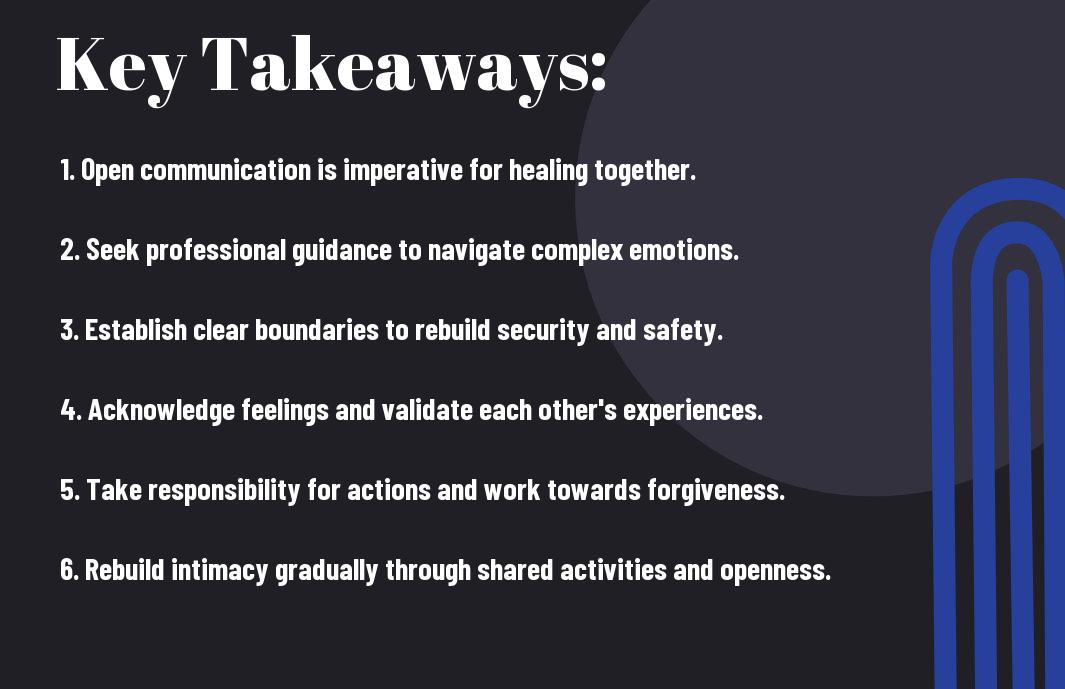There’s a path to healing after betrayal, but it often feels daunting. You may find yourself grappling with feelings of anger, confusion, and heartache, yet rebuilding trust is possible with the right guidance. Engaging with professionals like therapists and relationship coaches can provide you both with structured support to address underlying issues and facilitate open communication. Through understanding, accountability, and time, you can work together to mend what has been broken and create a foundation for a stronger, more resilient partnership.

Key Takeaways:
- Open and honest communication is imperative for both partners to express their feelings and experiences.
- Establishing boundaries can help rebuild security and respect in the relationship.
- Professional counseling or therapy can provide guidance and support during this challenging process.
- Taking responsibility and acknowledging the harm done is important for moving forward.
- Time is necessary for healing; rushing the process can lead to setbacks.
- Creating new shared experiences can help strengthen the bond and restore intimacy.
- Both partners should actively participate in rebuilding trust to foster accountability and commitment.

Understanding Trust and its Importance
Before addressing the aftermath of an affair, it’s necessary to understand what trust truly means and why it holds such significance in relationships. Trust forms the foundation of any partnership, creating a sense of safety and security that allows for emotional vulnerability and genuine connection. Without trust, the fabric of a relationship weakens, often leading to feelings of anxiety, insecurity, and heartbreak.
Defining Trust in Relationships
To define trust in relationships, think of it as the unwavering belief in your partner’s integrity, honesty, and ability to keep promises. It’s built over time through consistent actions, open communication, and mutual respect. When you trust someone, you feel secure enough to share your thoughts, feelings, and vulnerabilities without fear of judgment or betrayal.
The Impact of Betrayal
With betrayal comes the painful realization that someone you relied on has violated your trust. This breach can lead to feelings of isolation, sadness, and anger, as you grapple with the reality of how your relationship has changed. You may also find yourself questioning your judgment and feeling uncertain about future relationships. The emotional toll can be immense, affecting not just your bond with your partner but also your self-worth.
Defining the impact of betrayal extends beyond immediate emotional pain; it can undermine your overall well-being. Trust issues can manifest in constant second-guessing and skepticism, affecting how you view both your partner and future relationships. Consequently, anxiety and insecurity may seep into various facets of your life, making it challenging to feel connected to others. Understanding these effects is vital for recovery, as it allows you to begin the healing process and assess how to move forward with your partner or on your own.
The Aftermath of an Affair
You may feel overwhelmed and lost in the aftermath of an affair. The emotional fallout can be devastating, affecting both partners deeply. It’s necessary to address the pain and confusion that follows, as rebuilding trust requires acknowledging and confronting these feelings together.
Emotional Consequences for Both Partners
An affair can create intense emotional turmoil for both you and your partner. Feelings of betrayal, anger, guilt, and sadness often arise, leading to a cycle of blame and hurt. You must navigate these complex emotions, understanding that both partners may need support in processing their feelings and finding a path forward.
Recognizing the Need for Healing
Need to acknowledge that healing after an affair isn’t just necessary—it’s vital for both you and your partner. This period of recovery involves significant emotional work as you strive to rebuild a connection that has been deeply fractured. Engaging with professionals can help facilitate open dialogue and foster understanding, leading both of you toward a place of forgiveness and renewal. You may find that confronting the underlying issues is as important as addressing the affair itself.
And as you commence on the journey of healing, it’s important to focus on creating safe spaces for open conversations. This process may feel uncomfortable, but it’s a valuable opportunity for growth. Seeking guidance from couples therapy can provide you with tools to navigate discussions and emotional responses. By dedicating time to this healing phase, you reinforce your commitment to rebuilding a relationship that can emerge stronger from its challenges.
Expert Insights on Rebuilding Trust
Despite the challenges, rebuilding trust after an affair is possible with the right guidance. Experts emphasize understanding the difference between Rebuilding vs. Earning: Trust After Infidelity Explained. Success hinges on open dialogue, empathy, and a genuine commitment to change. Employing professional resources can pave the way to healing, facilitating a path back to mutual respect and love.
Professional Guidance and Counseling
Across the journey of rebuilding trust, seeking professional guidance is often invaluable. A licensed therapist or counselor specializes in navigating the tumultuous waters of infidelity and can help both partners understand their feelings and motivations. This support can facilitate healthier communication and promote emotional healing, ensuring that both you and your partner are actively engaged in the recovery process.
Effective Communication Strategies
Communication is the bedrock of restoring trust in your relationship. It’s important to engage in open and honest discussions about feelings, concerns, and aspirations. You should express your needs and actively listen to your partner’s perspective, fostering a safe environment that encourages vulnerability and understanding. Regularly practicing patience and empathy during these conversations can lead to greater intimacy and help you both navigate the path forward as a united front.
With effective communication strategies, you can significantly enhance your relationship’s recovery. Engage in active listening, where you don’t just hear but genuinely understand your partner’s emotions and viewpoints. Utilize “I” statements to express your feelings without placing blame, which fosters a more positive atmosphere for discussion. It’s also important to set aside dedicated time for these conversations, free from distractions, to ensure that you both feel heard and valued. This practice not only strengthens your emotional connection but also builds a foundation for trust that can withstand future challenges.

Steps to Rebuild Trust
For rebuilding trust after an affair, you must take intentional steps to mend the relationship. This journey is not easy, but commitment and open communication can guide you and your partner through this process. Start by acknowledging the hurt, creating new boundaries, and fostering a supportive environment for healing.
Acknowledging the Betrayal
Against the painful backdrop of betrayal, it’s crucial to openly acknowledge the affair’s impact on both you and your partner. This involves having honest conversations about feelings of hurt and anger while taking responsibility for your actions. Validation of emotions on both sides sets the stage for rebuilding trust.
Establishing New Boundaries
Between establishing new boundaries and fostering a healthier relationship, you must identify what is acceptable moving forward. Discuss openly what behaviors need to change to foster security in your relationship. These new boundaries create a framework for trust, ensuring both partners feel safe and respected in the future.
Plus, establishing new boundaries is about more than just setting rules; it’s about creating an environment of mutual respect and understanding. Focus on clear communication about needs and expectations to avoid past mistakes. Discuss what privacy means for both of you, identifying behavioral changes that mark a fresh start. These boundaries should be revisited regularly, as they are not static but evolve based on trust and security that grows over time.
Developing Transparency
Keep in mind that rebuilding trust after an affair requires a commitment to transparency. Both partners must work towards fostering an environment where openness is prioritized, allowing you to share thoughts and concerns without fear of judgment. This process can be challenging, but the effort will strengthen your relationship and facilitate healing.
Importance of Openness
Developing an attitude of openness is important for nurturing trust. When you and your partner are transparent about your feelings, motivations, and experiences, it creates a safe space for vulnerability. This honesty can facilitate communication, encourage emotional healing, and ultimately pave the way for rebuilding your connection.
Sharing Information and Feelings
Below are some strategies for effectively sharing your thoughts and emotions with your partner. Open conversations about your experiences, feelings, and needs are vital; openly discuss any insecurities or fears that stem from the affair. Creating a safe environment for this exchange promotes understanding, empathy, and connection.
Further, make it a habit to schedule regular check-ins where you both can express your feelings and share updates about your day-to-day lives. This practice not only fosters accountability but also demonstrates your commitment to each other. When you express suspicions or concerns about the relationship, do so with a focus on resolution rather than blame. This approach promotes a sense of partnership, as you both work towards healing together. Prioritizing sharing information leads to deeper emotional intimacy and reinforces the foundation of your renewed trust.
Creating a Support System
Your journey toward rebuilding trust after an affair requires a solid support system. Surrounding yourself with individuals who can offer understanding, guidance, and encouragement is necessary. Engaging with your friends and family can provide a sense of comfort, while professional help can offer expert advice in navigating this challenging terrain.
Leaning on Friends and Family
An effective way to rebuild trust is by leaning on friends and family. They can provide emotional support and a safe space for you to express your feelings and fears. Sharing your challenges with people who care about you can relieve isolation and remind you that you are not alone in this journey.
Joining Support Groups
Creating connections through support groups can significantly impact your healing process. These groups consist of individuals who have experienced similar situations, allowing you to share your story and gain insights from others. By participating in group discussions, you can foster understanding and compassion, as well as learn effective coping strategies. Additionally, receiving feedback and support from people who truly understand your experience can be incredibly empowering, bolstering your commitment to rebuild trust with your partner and within yourself.
Conclusion
To wrap up, rebuilding trust after an affair is a complex but achievable journey, especially with guidance from experts. Engaging in open communication, seeking therapy, and showing consistent commitment to change can help restore the foundation of your relationship. You have the power to navigate through this difficult time by investing the time and effort needed to heal. With the right support and strategies in place, you can emerge stronger together, fostering a renewed sense of trust and intimacy.
FAQ
Q: What are the first steps to take after discovering an affair?
A: The initial steps involve both partners reflecting on their thoughts and emotions. It’s important for the person who was unfaithful to acknowledge their actions and take responsibility. The betrayed partner should express their feelings openly. Seeking professional guidance from a counselor or therapist is often beneficial to facilitate communication and provide an unbiased perspective.
Q: How can couples rebuild trust after an affair?
A: Rebuilding trust requires consistent effort and transparency. The unfaithful partner should be open about their actions and willing to answer questions. Creating a plan for accountability—like sharing passwords or discussing whereabouts—can be helpful. Both partners should also establish open lines of communication and regularly check in on each other’s feelings as part of the healing process.
Q: How long does it take to rebuild trust after an affair?
A: The time frame for rebuilding trust varies significantly among couples. Factors include the depth of the betrayal, the willingness of both partners to work through their emotions, and the support they receive from experts. While it might take several months or even years, consistent effort and open communication can expedite the healing process.
Q: Should we seek professional help, and how do we choose the right expert?
A: Seeking professional help is often beneficial in rebuilding trust. Look for a therapist or counselor who specializes in relationships and infidelity. Recommendations from friends, online reviews, and initial consultations can help in choosing the right fit. It’s important to find someone who fosters a safe environment for both partners to share their feelings and guide the couple towards healing.
Q: What are some effective communication strategies during the healing process?
A: Open and honest communication is important. Couples can use “I” statements to express feelings without placing blame, such as “I felt hurt when…” Setting aside dedicated time for discussions about feelings and concerns is also helpful. Active listening techniques—such as summarizing what the other person has said—can ensure both partners feel heard and validated during the healing process.
